thank you for read my question.
When i debug puts function in glibc, I found something which couldn't understand.
// glibc-2.27/libio/ioputs.c
int
_IO_puts (const char *str)
{
int result = EOF;
size_t len = strlen (str);
_IO_acquire_lock (stdout);
if ((_IO_vtable_offset (stdout) != 0
|| _IO_fwide (stdout, -1) == -1)
&& _IO_sputn (stdout, str, len) == len
&& _IO_putc_unlocked ('\n', stdout) != EOF)
result = MIN (INT_MAX, len + 1);
_IO_release_lock (stdout);
return result;
}
weak_alias (_IO_puts, puts)
(part of calling _IO_sputn function in gdb)
As you can see, _IO_puts calls _IO_sputn function.
But when i check [r13+0x38] in gdb, there is a different value.
(different value)
Why
_IO_sputnfunction is called through_IO_file_jumps?And what is
_IO_file_jumps's role in glibc?How can
_IO_sputnfunction calls_IO_new_file_xsputnfinally ?
< Addition >
// glibc-2.27/libio/libioP.h
#define _IO_sputn(__fp, __s, __n) _IO_XSPUTN (__fp, __s, __n)
// glibc-2.27/libio/libioP.h
typedef size_t (*_IO_xsputn_t) (FILE *FP, const void *DATA,
size_t N);
#define _IO_XSPUTN(FP, DATA, N) JUMP2 (__xsputn, FP, DATA, N)
#define _IO_WXSPUTN(FP, DATA, N) WJUMP2 (__xsputn, FP, DATA, N)
// glibc-2.27/libio/libioP.h
struct _IO_jump_t
{
JUMP_FIELD(size_t, __dummy);
JUMP_FIELD(size_t, __dummy2);
JUMP_FIELD(_IO_finish_t, __finish);
JUMP_FIELD(_IO_overflow_t, __overflow);
JUMP_FIELD(_IO_underflow_t, __underflow);
JUMP_FIELD(_IO_underflow_t, __uflow);
JUMP_FIELD(_IO_pbackfail_t, __pbackfail);
/* showmany */
JUMP_FIELD(_IO_xsputn_t, __xsputn);
JUMP_FIELD(_IO_xsgetn_t, __xsgetn);
JUMP_FIELD(_IO_seekoff_t, __seekoff);
JUMP_FIELD(_IO_seekpos_t, __seekpos);
JUMP_FIELD(_IO_setbuf_t, __setbuf);
JUMP_FIELD(_IO_sync_t, __sync);
JUMP_FIELD(_IO_doallocate_t, __doallocate);
JUMP_FIELD(_IO_read_t, __read);
JUMP_FIELD(_IO_write_t, __write);
JUMP_FIELD(_IO_seek_t, __seek);
JUMP_FIELD(_IO_close_t, __close);
JUMP_FIELD(_IO_stat_t, __stat);
JUMP_FIELD(_IO_showmanyc_t, __showmanyc);
JUMP_FIELD(_IO_imbue_t, __imbue);
};
This is everything which I could find about _IO_sputn with ctags and cscope.

